![Rashomon [1950]](/pictures/1078426.jpg) Rashomon | DVD | (13/10/2008)
from £20.00
| Saving you £-0.01 (N/A%)
| RRP
Rashomon | DVD | (13/10/2008)
from £20.00
| Saving you £-0.01 (N/A%)
| RRP Famously, Rashomon - which won both the Golden Lion in Venice and the Oscar for Foreign-Language Film - introduced Western audiences to Japanese cinema in general and to the thrilling artistry of Akira Kurosawa in particular.
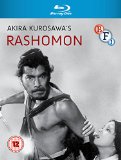 Rashomon (Blu-ray) | Blu Ray | (17/04/2019)
from £8.99
| Saving you £11.00 (122.36%)
| RRP
Rashomon (Blu-ray) | Blu Ray | (17/04/2019)
from £8.99
| Saving you £11.00 (122.36%)
| RRP This 1950 film by Akira Kurosawa is more than a classic: it's a cinematic archetype that has served as a template for many a film since. (Rashomon's most direct influence was on a Western remake, The Outrage, starring Paul Newman and directed by Martin Ritt.) In essence, the facts surrounding a rape and murder are told from four different and contradictory points of view, suggesting the nature of truth is something less than absolute. The cast, headed by Kurosawa's favourite actor, Toshiro Mifune, is superb. --Tom Keogh
![Ugetsu [4K UHD + Blu-Ray] (Criterion Collection)](/pictures/1168350.jpg) Ugetsu | Blu Ray | (19/05/2025)
from £19.99
| Saving you £N/A (N/A%)
| RRP
Ugetsu | Blu Ray | (19/05/2025)
from £19.99
| Saving you £N/A (N/A%)
| RRP By the time he made Ugetsu, Kenji Mizoguchi was already an elder statesman of Japanese cinema, fiercely revered by Akira Kurosawa and other directors of a younger generation
![Floating Clouds [Blu-ray]](/pictures/1165068.jpg) Floating Clouds | Blu Ray | (01/07/2024)
from £18.98
| Saving you £N/A (N/A%)
| RRP
Floating Clouds | Blu Ray | (01/07/2024)
from £18.98
| Saving you £N/A (N/A%)
| RRP During the war in French Indochina, a married Japanese man falls in love with a young typist, Yukiko, and promises to marry her after the war. Upon their return to Tokyo, their idyllic relationship crumbles, but they cannot keep away from one another. Despite finding nothing but conflict and instability, they helplessly return to each other repeatedly as they attempt to rebuild their lives from the ruins of World War II. A classic of Japanese cinema described as a 'masterpiece' by Yasujiro Ozu, Floating Clouds is a melancholy meditation on the hopeless side of love. Through the lens of Yukiko and Tomioka's tempestuous relationship, Mikio Naruse's most acclaimed film quietly captures the devastation of a country in economic post-war ruin. Product FeaturesExtras Newly restored and presented in High Definition Newly recorded audio commentary by film critic Adrian Martin Interview with Japanese film expert Freda Freiberg (2007, 11 mins) Paul Willeman on Floating Clouds (2007, 7 mins) Commentary on a scene (2007, 10 mins): Freda Freiberg provides a commentary on a key scene from the film **FIRST PRESSING ONLY** Illustrated booklet with new writing on the film, archive essay by Adrian Martin and credits
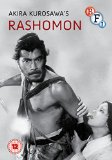 Rashomon (DVD) | DVD | (21/09/2015)
from £18.48
| Saving you £3.27 (19.56%)
| RRP
Rashomon (DVD) | DVD | (21/09/2015)
from £18.48
| Saving you £3.27 (19.56%)
| RRP This 1950 film by Akira Kurosawa is more than a classic: it's a cinematic archetype that has served as a template for many a film since. (Rashomon's most direct influence was on a Western remake, The Outrage, starring Paul Newman and directed by Martin Ritt.) In essence, the facts surrounding a rape and murder are told from four different and contradictory points of view, suggesting the nature of truth is something less than absolute. The cast, headed by Kurosawa's favourite actor, Toshiro Mifune, is superb. --Tom Keogh
![Ugetsu (1953) [The Criterion Collection] [Blu-ray]](/pictures/1148734.jpg) Ugetsu (1953) | Blu Ray | (04/03/2019)
from £32.98
| Saving you £N/A (N/A%)
| RRP
Ugetsu (1953) | Blu Ray | (04/03/2019)
from £32.98
| Saving you £N/A (N/A%)
| RRP Kenji Mizoguchi's tragic ghost story, one of the indisputable classics of world cinema. Having refined his craft in the silent era, Kenji Mizoguchi (Sansho the Bailiff) was an elder statesman of Japanese cinemafiercely revered by Akira Kurosawa and other younger directors by the time he made Ugetsu. And with this exquisite ghost story, a fatalistic wartime tragedy derived from stories by Akinari Ueda and Guy de Maupassant, he created a touchstone of his art, his long takes and sweeping camera guiding the viewer through a delirious narrative about two villagers whose pursuit of fame and fortune leads them far astray from their loyal wives. Moving between the terrestrial and the otherworldly, Ugetsu reveals essential truths about the ravages of war, the plight of women, and the pride of men. Features: New 4K digital restoration undertaken by The Film Foundation, with uncompressed monaural soundtrack Audio commentary by filmmaker, critic, and festival programmer Tony Rayns Kenji Mizoguchi: The Life of a Film Director (1975), a 150minute documentary by Kaneto Shindo Two Worlds Intertwined, a 2005 appreciation of Ugetsu by filmmaker Masahiro Shinoda Process and Production, a 2005 interview with Tokuzo Tanaka, first assistant director on Ugetsu Interview from 1992 with cinematographer Kazuo Miyagawa Trailers An essay by film critic Phillip Lopate and three short stories that influenced Mizoguchi in making the film
![Cold Fever [1995]](/pictures/1014285.jpg) Cold Fever | DVD | (20/09/2004)
from £N/A
| Saving you £N/A (N/A%)
| RRP
Cold Fever | DVD | (20/09/2004)
from £N/A
| Saving you £N/A (N/A%)
| RRP Shamed by his grandfather Japanese businessman Hirata cancels his golfing trip to Hawaii and instead travels to Iceland to perform a traditional ritual at the scene of his parent's death several years earlier. So begins one bizarre encounter after another as the reluctant Hirata treks across the frozen landscape... Breathtaking visuals and surreal comedy combine to make Cold Fever a unique and unforgettable experience.
![The Bad Sleep Well [1960]](/pictures/1000197.jpg) The Bad Sleep Well | DVD | (25/07/2005)
from £13.49
| Saving you £6.50 (48.18%)
| RRP
The Bad Sleep Well | DVD | (25/07/2005)
from £13.49
| Saving you £6.50 (48.18%)
| RRP A tense re-working of Hamlet (adapted from a novel by Ed McBain) is a biting expos of the corruption and politics of greed at the heart of Japanese business. Beautifully photographed in ravishing black and white Tohoscope this is original Japanese version never before released in Europe. A young man marries the boss's daughter as part of a scheme to take revenge on the influential businessman who forced his father to commit suicide. Leisurely paced bitterly ironic the film emplo
![Rashomon [1950]](/pictures/1006201.jpg) Rashomon | DVD | (22/10/2001)
from £N/A
| Saving you £N/A (N/A%)
| RRP
Rashomon | DVD | (22/10/2001)
from £N/A
| Saving you £N/A (N/A%)
| RRP This 1950 film by Akira Kurosawa is more than a classic: it's a cinematic archetype that has served as a template for many a film since. (Rashomon's most direct influence was on a Western remake, The Outrage, starring Paul Newman and directed by Martin Ritt.) In essence, the facts surrounding a rape and murder are told from four different and contradictory points of view, suggesting the nature of truth is something less than absolute. The cast, headed by Kurosawa's favourite actor, Toshiro Mifune, is superb. --Tom Keogh
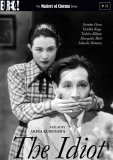 The Idiot | DVD | (14/11/2005)
from £N/A
| Saving you £N/A (N/A%)
| RRP
The Idiot | DVD | (14/11/2005)
from £N/A
| Saving you £N/A (N/A%)
| RRP Akira Kurosawa's The Idiot is his only adaptation of a Fyodor Dostoevsky novel and was a cherished project on which it is claimed he expended more effort than on any other film. A darkly ambitious exploration of the depths of human emotion it combines the talents of two of the greatest Japanese actors of their generation - Toshiro Mifune and Setsuko Hara. The Idiot is perhaps the most comprehensive of all of Kurosawa's works a tone which is heightened b
![Kokoro (The Heart) [Masters of Cinema] [1955]](/pictures/1091160.jpg) Kokoro (The Heart) | DVD | (23/02/2009)
from £13.19
| Saving you £8.06 (67.56%)
| RRP
Kokoro (The Heart) | DVD | (23/02/2009)
from £13.19
| Saving you £8.06 (67.56%)
| RRP Brimful with brooding psychological torment Kokoro is vintage Kon Ichikawa (An Actor's Revenge The Burmese Harp Tokyo Olympiad). Based on a novel by celebrated Japanese author Natsume Soseki the director foregrounds its themes of individual isolation and social estrangement most notably in a central protagonist stricken by existential demons and stranded by changing times. Why does Nobuchi (Masayuki Mori) visit the grave of his old friend Kaji (Tatsuya Mihashi)? Why is he so secretive with his wife Shizu (Michiyo Aratama)? And how does Nobuchi's friendship with the young student Hioki (Shoji Yasui) - for whom the older man acts as reluctant sensei - relate to his time with Kaji? As the Meiji Era draws to a close with the emperor's death and the suicide of General Nogi a fateful tale of tainted love failed friendship and redemptive honour unravels with tragic consequences. Though sometimes overlooked in the director's impressive oeuvre Ichikawa's profoundly beautiful rendering of Soseki's novel is a considerable work of cinema in its own right. The Masters of Cinema Series is proud to present Kokoro for home viewing in the UK for the very first time.
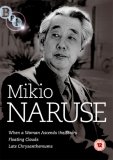 Mikio Naruse Collection | DVD | (26/11/2007)
from £149.90
| Saving you £-104.91 (N/A%)
| RRP
Mikio Naruse Collection | DVD | (26/11/2007)
from £149.90
| Saving you £-104.91 (N/A%)
| RRP Titles Comprise: 1. When a Woman Ascends the Stairs (Onna ga kaidan o agaru toki) (1960) 2. Floating Clouds (Ukigumo) (1955) 3. Late Chrysanthemums (Bangiku) (1958)
![Ugetsu Monogatari / Oyu-Sama (Masters Of Cinema) [1951]](/pictures/1081009.jpg) Ugetsu Monogatari / Oyu-Sama (Masters Of Cinema) | DVD | (21/04/2008)
from £N/A
| Saving you £N/A (N/A%)
| RRP
Ugetsu Monogatari / Oyu-Sama (Masters Of Cinema) | DVD | (21/04/2008)
from £N/A
| Saving you £N/A (N/A%)
| RRP Ugetsu Monogatar: Mizoguchi's Ugetsu Monogatari [Tales of the Rain and Moon] is a highly acclaimed masterwork of Japanese cinema. Based on a pair of 18th century ghost stories by Ueda Akinari. Amidst the pandemonium of civil war potter Genjuro (Mori Masayuki) and samurai-aspirant Tobei (Ozawa Sakae) set out with their wives in search of wealth and military glory respectively. Two parallel tales ensue when the men are lured from their wives: Genjuro by the ghostly charm of Lady Wakasa (Kyo Machiko); Tobei by the dream of military glory. Famed for its meticulously orchestrated long takes and its subtle blending of realistic period reconstruction and lyrical supernaturalism Ugetsu Monogatari is an intensely poetic tragedy that consistently features on polls of the best films ever made. Oyu-Sama:Another literary adaptation - this time of a story by one of Japan's modern literary masters novelist Tanizaki Jun'ichiro - Mizoguchi's Oyu-sama [Miss Oyu] is a poignant and contemplative tale of two sisters and their ill-fated relationship with the same man. At the core is Mizoguchi-regular Tanaka Kinuyo (who also stars in Ugetsu Monogatari) as the eponymous Oyu the older sister who allows marital customs to dictate the lives of those caught up in this complex love triangle. Continuing the director's fascination with the relationship between affairs of the heart and the social mores that shape and sometimes destroy them Mizoguchi transforms his subject matter into the realm of the transcendental through the use of long mobile shots - an approach that reaches its apotheosis in a take of almost six minutes - infused with humanity and emotion.
![Ugetsu Monogatari [Masters of Cinema] (Dual Format Edition) [Blu-ray]](/pictures/1113975.jpg) Ugetsu Monogatari | Blu Ray | (23/04/2012)
from £N/A
| Saving you £N/A (N/A%)
| RRP
Ugetsu Monogatari | Blu Ray | (23/04/2012)
from £N/A
| Saving you £N/A (N/A%)
| RRP Mizoguchi's Ugetsu Monogatari [Tales of the Rain and Moon, aka Ugetsu] is a highly acclaimed masterwork of Japanese cinema. Based on a pair of 18th century ghost stories by Ueda Akinari, the film's release continued Mizoguchi's introduction to the West, where it was nominated for an Oscar and won the the Venice Film Festival's Silver Lion award (for Best Direction). In 16th century Japan, amidst the pandemonium of civil war, potter Genjuro (Mori Masayuki) and samurai-aspirant Tobei (Ozawa Sakae) set out with their wives in search of wealth and military glory respectively. Two parallel tales ensue when the men are lured from their wives: Genjuro by the ghostly charm of Lady Wakasa (Kyo Machiko); Tobei by the dream of military glory. Famed for its meticulously orchestrated long takes and its subtle blending of realistic period reconstruction and lyrical supernaturalism, Ugetsu Monogatari is an intensely poetic tragedy that consistently features on polls of the best films ever made.
![The Lady Of Musashino [1951]](/pictures/1011917.jpg) The Lady Of Musashino | DVD | (26/04/2004)
from £N/A
| Saving you £N/A (N/A%)
| RRP
The Lady Of Musashino | DVD | (26/04/2004)
from £N/A
| Saving you £N/A (N/A%)
| RRP Mizoguchi's dissection of the Japanese reaction to the aftermath of war as a fastidiously moral woman faces upheaval with the changing times brought about by the new post-Imperial period...
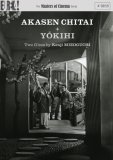 Akasen Chitai/Yokihi | DVD | (26/05/2008)
from £N/A
| Saving you £N/A (N/A%)
| RRP
Akasen Chitai/Yokihi | DVD | (26/05/2008)
from £N/A
| Saving you £N/A (N/A%)
| RRP Filmed shortly before the Japanese government's introduction of an anti-prostitution bill Akasen Chitai is a compelling study of women torn between financial necessity and questions of conscience. It was nominated for the prestigious Golden Lion at the Venice Film Festival and inspired French critic Jean Douchet to proclaim: ""For me along with Chaplin's Monsieur Verdoux and Renoir's La Rgle du Jeu the greatest film in the history of cinema"". Set many centuries earlier Yokihi [Imperial Concubine Yang aka Yang Kwei Fei] recounts the Chinese legend referred to in its title. In eighth-century T'ang China widowed Emperor Hsan-tsung (Masayuki Mori) reigns alone devoting his life to the composition of music. When he meets and falls in love with a beautiful young woman (Machiko Kyo) who will become his imperial concubine a tale of political intrigue and rival dynasties is set in motion with ultimately tragic consequences. Sumptuously filmed in vibrant colour Yokihi is the most ancient of Mizoguchi's costume dramas yet its central themes of passion sorrow and the conflict between love and power remain timeless - it was also nominated for the Golden Lion at Venice.
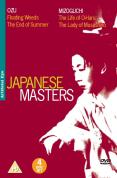 The Japanese Masters Collection | DVD | (09/10/2006)
from £N/A
| Saving you £N/A (N/A%)
| RRP
The Japanese Masters Collection | DVD | (09/10/2006)
from £N/A
| Saving you £N/A (N/A%)
| RRP Floating Weeds (Dir. Yasujiro Ozu 1959): Floating Weeds is one of the final films directed by the legendary Japanese filmmaker Yasujiro Ozu. A remake of one of his own silent features it tells the story of a travelling Kabuki acting troupe led by Komajuro who arrive in a small coastal town. There Komajuro is reunited with his former lover Oyoshi and their illegitimate son who is unaware that the itinerant actor is his father. But the reunion provokes the jealousy of Sumiko Komanjuro's current mistress who plots a devastating revenge. Beautifully composed and surperbly played 'Floating Weeds' is one of Ozu's most affecting poignant and powerful films. The End Of Summer (Dir. Yasujiro Ozu 1961): This penultimate film by Japanese master director Yasujiro Ozu examines the difficulties faced by the Kohayagawa family as they struggle to adapt their traditional values to a rapidly changing post-war Japan. As the family's generations-old sake making business begins to fail in the face of increasingly fierce competition Manbei the incorrigible elderly patriarch rekindles an affair with an old flame much to the disapproval of his daughter Fumiko. He is further distracted by his attempts to marry off his other two daughters: Akiko the eldest and a widow with a small son and Noriko the youngest who is still single. A sublime bittersweet elegy for a vanishing world The End of Summer is beautifully shot in muted colour elegantly acted and masterfully directed by one of the 20th Century's greatest filmmakers. The Lady of Musashino (Dir. Kenji Mizoguchi 1951): Mizoguchi's dissection of the Japanese reaction to the aftermath of war as a fastidiously moral woman faces upheaval with the changing times brought about by the new post-Imperial period... The Life of Oharu (Dir. Kenji Mizoguchi 1952): In feudal Japan the daughter of a samurai Oharu falls in love with a man below her station. Expelled from the castle in Kyoto her family tries to regain respectability but Oharu is forced into a new life as a concubine and then a fallen woman ever hoping to preserve some semblance of purity in a corrupt world...

Please wait. Loading...
This site uses cookies.
More details in our privacy policy